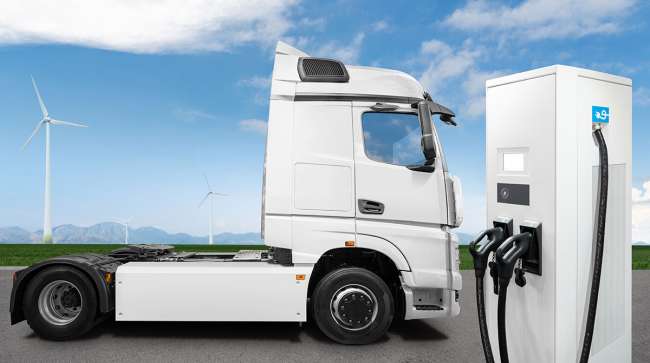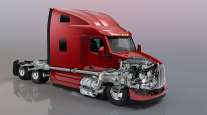Staff Reporter
Five States Seek CARB Delays When Regs Take Effect in 2025

[Stay on top of transportation news: Get TTNews in your inbox.]
Truckers and legislators in half of the 10 states that automatically adopted California’s Advanced Clean Trucks regulation are trying to put the brakes on before the 2025 rules take effect for their residents.
At issue are looming requirements to start imposing the regulation enacted by the California Air Resources Board zero-emission electric vehicles sales requirements, plus a one-time reporting requirement for large companies and fleets.
The first of the 10 states to follow California’s lead will see CARB restrictions start in 2025. They are Massachusetts, New Jersey, New York, Oregon and Washington. Vermont’s date begins in 2026. Colorado, Maryland, New Mexico and Rhode Island have until 2027.
Oregon Trucking Associations President Jana Jarvis told Transport Topics that four carriers and three dealerships discussed ACT-related problems in July with Gov. Tina Kotek, who promised to look into the matter.

Jarvis
“About a month ago, our Department of Environmental Quality announced they would be asking their commission to ‘delay’ the NOx Omnibus rule until 2026 in order to give Oregon carriers more options for new equipment next year,” Jarvis said. “Unfortunately, there is a disconnect because they don’t understand that without a delay of the ACT there will be very few internal combustion engines sold in our state next year — even though more internal combustion engine trucks will qualify.”
In Washington, trucking industry stakeholders have been alerting the public and lawmakers about detrimental impacts from implementing ACT. Sheri Call, CEO of Washington Trucking Associations, has been working with members and seeking to halt the ACT mandate on manufacturers. In August, she wrote to Gov. Jay Inslee and four state lawmakers warning that some dealers estimate zero-emission medium- and heavy-duty trucks are unsuitable for 90% of existing routes.
WTA-Advanced-Clean-Trucks-letter final
Starting next year, Washington manufacturers must sell 7% of all heavy-duty trucks as zero-emission vehicles and incrementally raise that number.
“Given that the buying cycle for trucks can be as long as two years, owners are placing orders for model year 2025 and beyond today. This means Washington trucking companies are already experiencing the consequences of ACT mandates right now, prompting WTA members to evaluate their options given cost and infrastructure constraints,” Call said.

Call
“Truck manufacturers are also withholding truck deliveries until a dealer can demonstrate that a ZEV truck has been sold. This means dealers, whether they are in-state or out-of-state, who do not sell a ZEV truck in Washington will not receive legacy vehicle allocations, which means truck dealers cannot sell diesel trucks in Washington state,” she added.
Jackson Maynard, executive director of the Citizen Action Defense Fund, in September wrote to Inslee and Laura Watson, department of ecology director. “The current schedule does not consider the realities of trucking and ancillary industries, and will cost Washington’s economy dearly,” he predicted.
Steve Gordon, principal at Gordon Truck Centers, is a Freightliner dealer in Oregon, Washington, California Alaska and Hawaii. His company may increase new truck sales at its Idaho location where no ACT regulation exists.
“I am personally trying to work through positive discussions with political leaders who don’t seem to realize how the adoption of these standards are nearly impossible given the state of the technology at this point,” Gordon said.
Freight contractors & brokers must retain records and verify that heavy-duty vehicles or fleets they contract with for services are compliant, including public agencies.https://t.co/8bfGaVPRbZ pic.twitter.com/HeVvdGGrHX — CARBTruckStop (@CARBTruckStop) November 1, 2024
Morgan Irwin, government affairs director of the Association of Washington Business, also penned a letter, saying, “We need time in Washington if we are going to successfully comply with ACT without causing a major disruption to our way of life.”
• In New Jersey, state Sen. Patrick Diegnan Jr. (D) and Assemblyman Clinton Calabrese (D) in October backed legislation to delay ACT implementation by two years to avoid supply chain repercussions. The move was supported by the New Jersey Motor Truck Association and New Jersey Coalition of Automotive Retailers.

Hochul
• Trucking Association of New York and others are asking Gov. Kathy Hochul to immediately postpone ACT and the 2026 date for the Heavy-Duty Omnibus rule. TANY’s website has an “Action Center” for stakeholders to write letters addressed to Hochul and other New York lawmakers.
• Trucking Association of Massachusetts is seeking a delay in ACT implementation from one to two years so truck dealers, as well as public and private fleet owners, can deal with technology, availability and capacity issues.
In October, the only ACT relief approved by the state environmental protection department was exempting (for model years 2025 and 2026) Massachusetts state agencies and municipalities that purchase diesel trucks as snowplows/for snow removal and street sweepers.
Reacting to this exemption, TAM Executive Director Kevin Weeks and Robert O’Koniewski, executive vice president and general counsel for Massachusetts State Automobile Dealers Association Inc., cowrote a letter to Gov. Maura Healey.
They predicted “industries ranging from traditional freight delivery, perishable foods delivery, medical necessities, home heating oil, landscaping and construction to towing and forestry, will not be able to buy the MHD trucks they need in the coming year.”
Want more news? Listen to today's daily briefing below or go here for more info:




